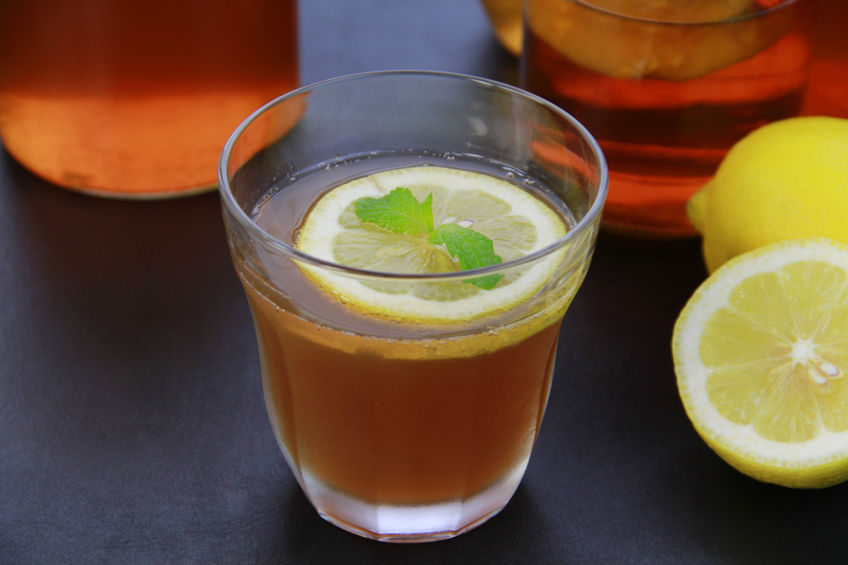Kombucha
Lately, Kombucha has been getting a lot of recognition in Health and Nutrition magazines, health food grocery stores and even in the hands of celebrities. It has become a staple among my personal trainer friends and I’ve even seen it being sold at local farmer’s markets.
Why the sudden craze? What exactly is it?
According to Brent A. Bauer, MD from the Mayo Clinic, “Kombucha tea is a fermented drink made with tea, sugar, bacteria and yeast.”
It is sometimes called “mushroom-tea.” This is because the colony of bacteria and yeast forms a “mushroom-like” mass. The process of making Kombucha tea entails adding the colony of bacteria and yeast to sugar and tea. Fruit juice or other flavorings are sometimes added to mainstream Kombucha products to minimize the vinegar-taste that naturally occurs. The combination of bacteria and yeast with sugar initiates the fermentation process. The resulting liquid contains vinegar, B vitamins, trace amounts of alcohol (a natural result of fermentation), antioxidants and other chemical compounds.
You might have read claims that Kombucha is a “cure-all.”
It has been reported to have benefits ranging from curing cancer and arthritis to improving mood and mental clarity. While there isn’t substantial scientific evidence supporting those claims, it is known that Kombucha has immune-boosting benefits and aids in digestion. These known benefits are due its healthy bacteria content also known as probiotics.
Here’s the catch—the probiotics only maintain their integrity when the drink is unpasteurized. This is because the pasteurization process kills harmful bacteria as well as the beneficial probiotics. While drinking 4oz of unpasteurized Kombucha per day is generally safe for healthy individuals, it is not recommended for pregnant women or those with compromised immune systems.
Kombucha can be made at home from a by either buying a culture starter (aka: a Scoby) or getting one from a friend who has culture that has produced offshoots, and fermenting it in a clean jar for seven to 14 days. If you chose to go this route, be sure to research the proper technique and ensure that it is conducted under highly sanitary conditions. To avoid possible lead poisoning, refrain from using ceramic pots for brewing. It is possible for the acids in the tea to leach lead from the ceramic glaze.
Sometimes, Kombucha contains sediment at the bottom of the bottle. This isn’t cause for alarm, as it is just a remnant of the yeast/bacteria strains.
So, is it worth incorporating into your daily regimen?
If you’re a soda fanatic and are looking for a lower-sugar alternative, this might help you wean yourself of the soda habit. Most Kombucha contains 30 calories per each 8oz serving. The average bottle has about 2 servings. Be mindful that even though it is lower in sugar than soda it does still contain sugar. Therefore, you want to consume it in moderation. Try unsweetened herbal teas, flavored mineral water, or fruit-infused water if you need something else with flavor.
It is important to note that most commercially sold Kombucha averages $3.50 per bottle. The recommendations for consumption listed on many brands encourage daily consumption of one to two times per day. If you’re not making your own, this can quickly add up (like a Starbucks habit).
If you buy Ginger infused Kombcha, this can help with digestion or soothe and upset stomach, but the same benefits could be achieved by drinking ginger tea. In addition to the claims that this is a “cure-all,” there have been reported cases of adverse reactions to Kombucha such as infection, stomach upset, and nausea.
Bottom Line: If you like it, enjoy it on occasion. I have many friends that absolutely love it. If you haven’t tried it or, like my husband, can’t stand the taste, don’t force yourself to chug it down for the probiotic benefits. There isn’t enough supported evidence to deem it a true nutrient powerhouse and there are much better sources of probiotics such as cultured yogurt or probiotic capsules.
Resources:
- http://www.mayoclinic.org/healthy-lifestyle/consumer-health/expert-answers/kombucha-tea/faq-20058126
- https://www.organicfacts.net/health-benefits/beverage/health-benefits-of-kombucha.html
- https://www.washingtonpost.com/lifestyle/wellness/2014/10/28/7ba5f68a-5ad6-11e4-8264-deed989ae9a2_story.html












